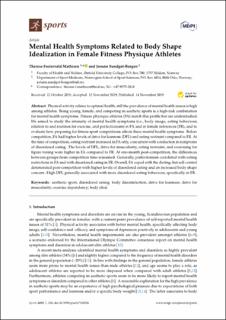| dc.contributor.author | Mathisen, Therese Fostervold | |
| dc.contributor.author | Sundgot-Borgen, Jorunn | |
| dc.date.accessioned | 2020-05-12T09:24:27Z | |
| dc.date.available | 2020-05-12T09:24:27Z | |
| dc.date.created | 2019-11-14T10:23:09Z | |
| dc.date.issued | 2019 | |
| dc.identifier.citation | Sports. 2019, 7(11), 236. | en_US |
| dc.identifier.issn | 2075-4663 | |
| dc.identifier.uri | https://hdl.handle.net/11250/2654032 | |
| dc.description | This is an open access article distributed under the Creative Commons Attribution License (https://creativecommons.org/licenses/by/4.0/) which permits unrestricted use, distribution, and reproduction in any medium, provided the original work is properly cited. | en_US |
| dc.description.abstract | Physical activity relates to optimal health, still the prevalence of mental health issues is high among athletes. Being young, female, and competing in aesthetic sports is a high-risk combination for mental health symptoms. Fitness physique athletes (FA) match this profile but are understudied. We aimed to study the intensity of mental health symptoms (i.e., body image, eating behaviour, relation to and routines for exercise, and perfectionism) in FA and in female references (FR), and to evaluate how preparing for fitness sport competitions affects these mental health symptoms. Before competition, FA had higher levels of drive for leanness (DFL) and eating restraint compared to FR. At the time of competition, eating restraint increased in FA only, concurrent with a reduction in symptoms of disordered eating. The levels of DFL, drive for muscularity, eating restraint, and exercising for figure toning were higher in FA compared to FR. At one-month post-competition, the differences between groups from competition time remained. Generally, perfectionism correlated with eating restrictions in FA and with disordered eating in FR. Overall, FA coped with the dieting, but self-control deteriorated post-competition with higher levels of disordered eating and an increased body shape concern. High DFL generally associated with more disordered eating behaviour, specifically in FR. | en_US |
| dc.language.iso | eng | en_US |
| dc.subject | aesthetic sport | en_US |
| dc.subject | disordered eating | en_US |
| dc.subject | body dissatisfaction | en_US |
| dc.subject | drive for leanness | en_US |
| dc.subject | drive for muscularity | en_US |
| dc.subject | exercise dependency | en_US |
| dc.subject | body ideal | en_US |
| dc.title | Mental Health Symptoms Related to Body Shape Idealization in Female Fitness Physique Athletes | en_US |
| dc.type | Peer reviewed | en_US |
| dc.type | Journal article | en_US |
| dc.description.version | publishedVersion | en_US |
| dc.source.journal | Sports | en_US |
| dc.identifier.doi | 10.3390/sports7110236 | |
| dc.identifier.cristin | 1747425 | |
| dc.description.localcode | Seksjon for idrettsmedisinske fag / Department of Sport Medicine | en_US |
| cristin.unitcode | 150,34,0,0 | |
| cristin.unitname | Seksjon for idrettsmedisinske fag | |
| cristin.ispublished | true | |
| cristin.fulltext | original | |
| cristin.qualitycode | 1 | |
